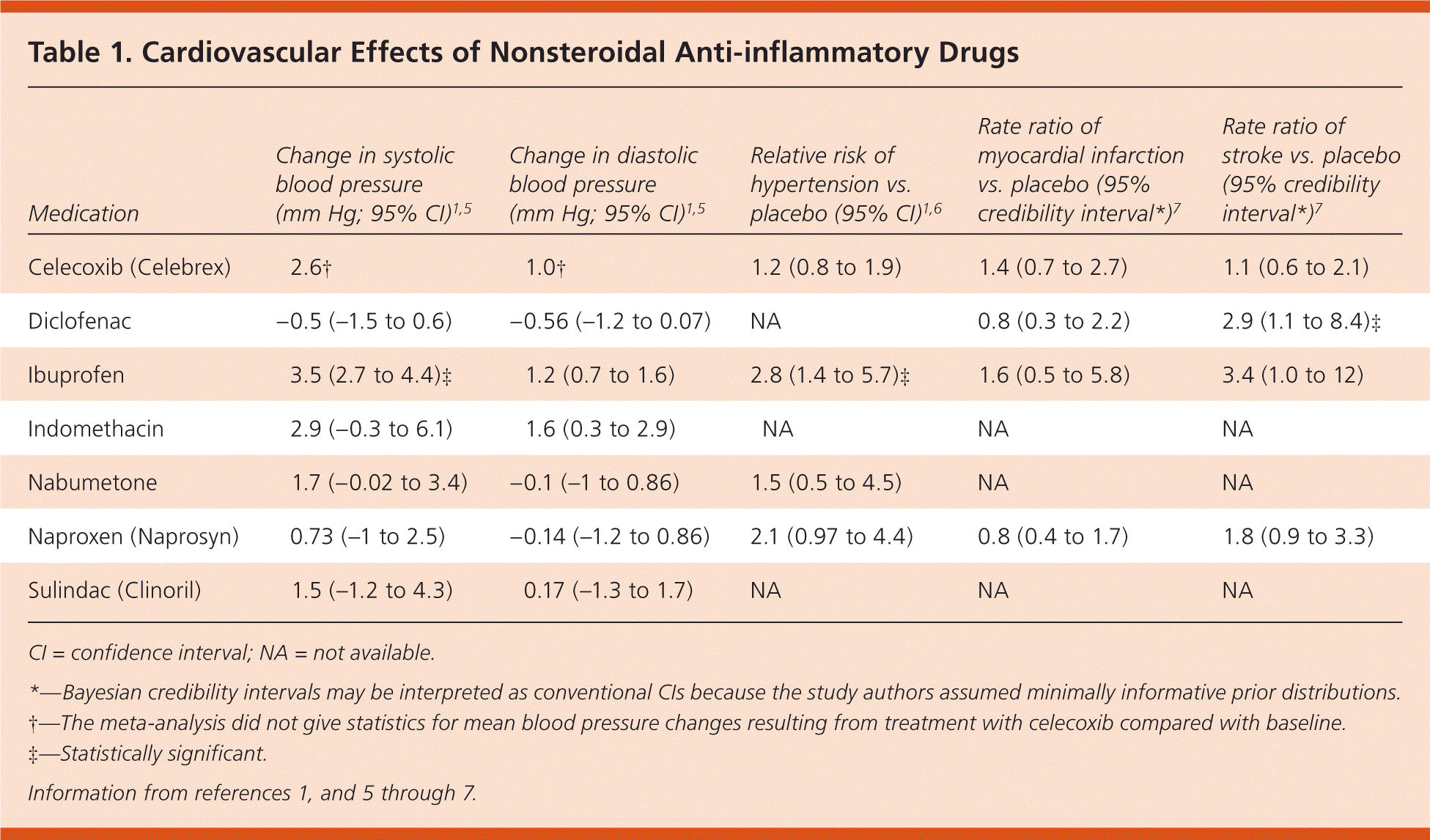
Am Fam Physician. 2014;90(4):online
Author disclosure: No relevant financial affiliations.
Clinical Question
Do nonsteroidal anti-inflammatory drugs (NSAIDs) cause a clinically significant increase in blood pressure?
Evidence-Based Answer
Aspirin does not elevate blood pressure. Among nonselective NSAIDs, ibuprofen increases the risk of hypertension and stroke. Diclofenac does not increase the risk of hypertension, but does increase the risk of stroke. Naproxen (Naprosyn) does not increase the risk of hypertension or stroke. Celecoxib (Celebrex) does not increase the risk of hypertension or stroke.
Evidence Summary
ASPIRIN AND NONSELECTIVE NSAIDS
Two meta-analyses (N = 158 studies) evaluated aspirin trials that included data on blood pressure.1,2 Aspirin dosages were greater than 1.5 g per day. There was no statistically significant effect on blood pressure. In a trial of 18,700 patients with hypertension, participants were randomized to receive aspirin (75 mg daily) or placebo for a mean of 3.8 years.3 There was no effect on blood pressure. There were significant reductions in rates of myocardial infarction among participants who were also receiving angiotensin-converting enzyme inhibitors (risk ratio [RR] = 0.39; 95% confidence interval [CI], 0.21 to 0.71).
A systematic review identified 32 randomized controlled trials (RCTs) that included 3,626 patients who were treated for at least four weeks with nonselective NSAIDs.4 Patients were monitored for changes in blood pressure and rates of hypertension during treatment. Most studies enrolled patients with osteoarthritis or rheumatoid arthritis, although some included patients with other conditions. Patients who received ibuprofen had a greater incidence of new hypertension compared with those in the control group (2.9% vs. 1%; RR = 2.9; 95% CI, 1.4 to 5.7; number needed to harm = 53).
CYCLOOXYGENASE-2 INHIBITORS
A meta-analysis of 19 RCTs that included 45,000 patients with arthritis evaluated blood pressure after more than four weeks of treatment with cyclooxygenase-2 inhibitors, nonselective NSAIDs, or placebo5 (Table 11,5–7 ). Another meta-analysis that included 49 RCTs with 130,000 patients—most of whom had arthritis—evaluated the effects of these agents on the diagnosis of hypertension after more than four weeks of treatment.6 Celecoxib was not associated with an increased rate of hypertension. The study did not report absolute risk changes or provide numbers needed to treat or harm.

| Medication | Change in systolic blood pressure (mm Hg; 95% CI)1,5 | Change in diastolic blood pressure (mm Hg; 95% CI)1,5 | Relative risk of hypertension vs. placebo (95% CI)1,6 | Rate ratio of myocardial infarction vs. placebo (95% credibility interval*)7 | Rate ratio of stroke vs. placebo (95% credibility interval*)7 |
|---|---|---|---|---|---|
| Celecoxib (Celebrex) | 2.6† | 1.0† | 1.2 (0.8 to 1.9) | 1.4 (0.7 to 2.7) | 1.1 (0.6 to 2.1) |
| Diclofenac | −0.5 (−1.5 to 0.6) | −0.56 (−1.2 to 0.07) | NA | 0.8 (0.3 to 2.2) | 2.9 (1.1 to 8.4)‡ |
| Ibuprofen | 3.5 (2.7 to 4.4)‡ | 1.2 (0.7 to 1.6) | 2.8 (1.4 to 5.7)‡ | 1.6 (0.5 to 5.8) | 3.4 (1.0 to 12) |
| Indomethacin | 2.9 (−0.3 to 6.1) | 1.6 (0.3 to 2.9) | NA | NA | NA |
| Nabumetone | 1.7 (−0.02 to 3.4) | −0.1 (−1 to 0.86) | 1.5 (0.5 to 4.5) | NA | NA |
| Naproxen (Naprosyn) | 0.73 (−1 to 2.5) | −0.14 (−1.2 to 0.86) | 2.1 (0.97 to 4.4) | 0.8 (0.4 to 1.7) | 1.8 (0.9 to 3.3) |
| Sulindac (Clinoril) | 1.5 (−1.2 to 4.3) | 0.17 (−1.3 to 1.7) | NA | NA | NA |
CARDIOVASCULAR OUTCOMES
A meta-analysis compared the cardiovascular safety of naproxen, ibuprofen, diclofenac, and celecoxib.7 It included 31 RCTs (N = 120,000 patients) that had more than 100 patient-years of follow-up per treatment arm, and that reported on the cardiovascular end points of myocardial infarction, stroke, cardiovascular death, and death from any cause (Table 11,5–7 ). None of the drugs significantly increased the risk of myocardial infarction. Compared with placebo, diclofenac increased the risk of stroke, the total cardiovascular death rate (rate ratio = 4.0; 95% CI, 1.5 to 13), and all-cause mortality (rate ratio = 2.3; 95% CI, 1.0 to 4.9). Ibuprofen, naproxen, and celecoxib had no significant effect on the total cardiovascular death rate or all-cause mortality.
Recommendations from Others
The seventh report of the Joint National Committee on Prevention, Detection, Evaluation, and Treatment of High Blood Pressure states that NSAIDs are associated with hypertension and resistant hypertension.8
